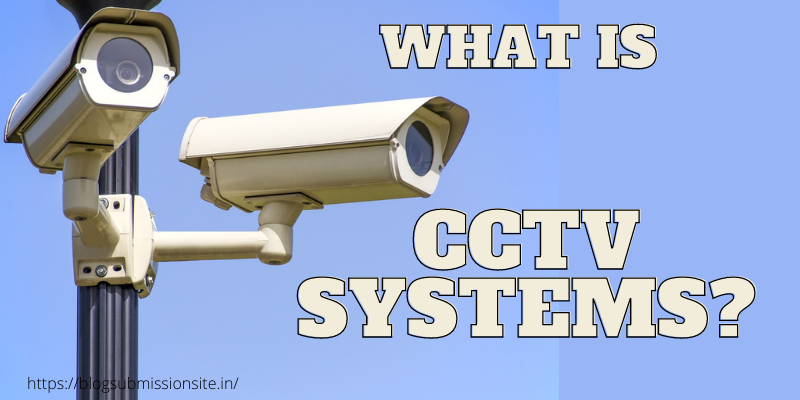What is CCTV Systems?
CCTV stands for Closed-Circuit Television. CCTV System is a system which is basically used to keep an eye on what’s going on in and around your business. Cameras and monitors or PCs help you to watch events live and record archived footage for later reference. Don’t think of CCTV monitors as ordinary television.
What is the meaning of CCTV?
CCTV is known as Closed-Circuit Television and video surveillance. The meaning of “Close Circuit” is that the broadcast is normally transmitted on limited (off) monitors, as opposed to “regular” TVs, which are broadcast to a large number of people. Generally, CCTV networks or CCTV cameras are used to discover and stop criminal activity and to record traffic violations, but they have other uses too.
Application of CCTV
- Management of Crime
- Calamity management
- City and community road maintenance
- Medical observation and diagnosis
-
Management of Crime
Surveillance of CCTV can curb potential criminals. When a crime occurs, video footage can help law enforcement and then provide evidence to prosecute in a court of law. Sensors used in conjunction with CCTV, audio, thermal and other types of sensors can alert authorities about unusual events, e.g. A fire or a bullet somewhere.
For businesses, CCTV cameras can detect and monitor domestic criminal activity. Prisons can monitor videos to prevent drones from delivering drugs and other prohibited items to inmates. Security cameras are able to monitor parts that are not easily accessible, e.g. Thatch.
2. Calamity/Disaster management
Using CCTV cameras, emergency services and rescue personnel, disaster management teams are able to evaluate and monitor events in real-time to relay “situations” via video, e.g. From the inside of a burning building, from a cave, or from a helicopter flying over a scene.
3. City and community road maintenance
Cameras at traffic lights and elsewhere in the city monitor people to collect traffic statistics as well as evidence footage for speed. A successor to IoT, AoT is a Chicago venture that collects real-time data about the city, primarily the weather and the environment. Some sensory nodes include security cameras that analyze the images they record but do not transmit or store these images to protect the privacy of individuals. The key is to store a limited number of uses for “developing computer vision software” by senior researchers. The project has been met with some opposition from privacy watchdogs.
4. Medical observation and diagnosis
There is a total of 43 facial muscles that express people’s thoughts and feelings. Smart software can recognize or identify these expressions, e.g. Pain or anxiety, which people can easily do through images. CCTV cameras can keep eyes on patients – for example, children or the elderly – to identify or detect potential medical emergencies, e.g. Stroke, or epilepsy, or asthma attack.
How Does CCTV Camera work?
CCTV Camera works by continuously sequencing images through cameras that are then transmitted via cable or wireless (depending on the system type chosen) to the recording device and then to the display monitor, allowing a person to see the sequence of Image and video footage.
Types of CCTV Camera
There are 8 different and most popular types of CCTV Camera:
- Dome CCTV Camera
- Bullet CCTV Camera
- C-Mount CCTV Camera
- PTZ Pan Tilt & Zoom Camera
- Day/Night CCTV Cameras
- Infrared/night vision CCTV Camera
- Network/IP CCTV Camera
- Wireless CCTV Camera
Dome CCTV Camera
Dome camera is the type of security camera, which is used for indoor installation. The name of the dome camera comes from the dome-shaped structure. These cameras are only used for daytime camera projects.
Bullet CCTV Camera
These cameras are designed to capture the visual of a specific area, fixed in a specific location, and work well as home security cameras. Bullet CCTV camera is thin and cylindrical in design. These cameras are further categorized into ultra bullets, usually distinguished by their small size and cheap price.
Network/IP CCTV Camera
Internet Protocol camera or Network/IP CCTV Camera is like a digital security camera that receives and sends video footage using the IP network. They are generally used for surveillance. Apart from analog closed-circuit television cameras (CCTV), IP cameras don’t require a local recording device or equipment, only a local network.
Advantages of CCTV
- It avoids internal and external theft
- Prevents Crime
- Collects evidence
- Staff security
- Surveillance of private and sensitive areas
- Ensuring customer satisfaction
- Protection from false liability lawsuits
Disadvantages of CCTV
- The biggest disadvantage of using CCTV is related to privacy, especially when used in the workplace. It may be to help keep employees and customers safe, they may object to being filmed under constant supervision
- The Cost of CCTV installation is high
If you want to install Security CCTV Systems for your industry or environment then contact Efficient Fire and Security Solutions Private Limited Today. They are providing the best services related to fire safety and security at an affordable cost.





hello. topic for me thanks kelly
i found this web and i would to help you with evolution. i am from UAE ;D
yes, ofcourse
send mail on [email protected]